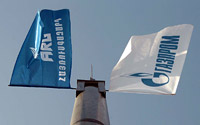During the past two months we have discussed the issue of ArmRusGazArd (ARG) company’s policy and situation for two times. These processes directly concern and may affect on the gas import to Armenia. The first impact may be before the upcoming election, and the second one after that.
The company’s comprehensive report 2011 has been published in the web site. The report contains many “expected” data. For example, it writes that the ARG closed the year with AMD15.4 billion drams loss.
As we have written before, even though it has been officially reported that the ARG buys gas from Russia at a price of $180 per 1000 cubic meters, in reality this amount is $210-220. This information has not been refuted because simple calculations based on the foreign trade information of the state income committee show that the customs fee of natural gas has grown. We also wrote an opinion that as a result of that the ARG might have losses. As far as the report had not been published, we were assuming that the loss would be bigger in 2011 (in consideration of the price increase). The documents published on Friday show that this was the case how it happened. The company closed the financial year of 2011 with AMD15.4 billion loss, in case when the loss of the previous year had been AMD10.8 billion.
The question is why the company does not raise the fee for gas consumption if it results in losses. Are not they allowed to do that? The sector is regulated by the public committee on services regulation. The committee may approve or reject the company’s proposal to raise the prices. In fact for the company the possibility of rejection is a risk. It is written in the report for 2010 as well: “The results of the ArmRusGasArd’s financial activities strongly depend on the price regulation policy of the RA committee on regulation of public services. Any changes in such policy that may result in reduction of the gas price and the company’s services may impact the company’s financial situation, which in its turn may become a reason for reduction of the investment quality of ArmRusGasArd CJSC’s securities. However, during 2010 the company did not deal with this risk, and since April1, 2010, the prices of natural gas were increased.” However, the interesting thing here is that the company did not apply to the mentioned committee.
Let’s leave the risks aside and discuss facts. First, the capacity of gas import grew in 2011 compared to 2010. In 2011 Armenia imported 1609.2 million cubic meter of gas from Russia, in case when in 2010 the import capacity was 1440.1 million cubic meters. The capacity of the gas imported from Iran grew as well and reached 460 million cubic meters.
The report also writes that in 2011 the company’s income grew by 25 billion drams and reached 150.2 billion. The net price of sale grew as well and even increased the income, reaching 151.5 billion. The most important fact is that the company is working with losses and even the losses are growing through the time. By the way, during the crisis year of 2009 the company had an income of AMD3.3 billion.
The loss capacity as of December 31, 2011, amounted 28.9 billion drams. Certainly the main shareholders may not like this fact.
One month ago there were rumors saying that the administration of GazProm were complaining about this financial situation and wanted to take the entire management under its control. They wanted at least to make strategic changes in the staff. However, these rumors were refuted by the ARG.
On June 29 there was an event, which did not gain a due attention in Armenia. The company’s official statement writes that on June 29 the head of the company’s board of directors Alexey Miller and the minister of energy and natural resources Armen Movsisyan had a meeting. “The parties discussed issues of bilateral cooperation, including issues concerning the fulfillment of the agreement on the involvement of GazProm in Armenia’s energetic projects. Also an agreement was reached to start the operation of the fifth bloc of Hrazdan HES, which will contribute to meeting the growing demand of energy in Armenia’s neighboring countries. During the negotiation the parties also discussed the price formation of the Russian gas imported to Armenia and the issue of increasing the capacity of supply in 2012-2013,” write the statement.
You may have noticed that the “meeting” slightly transformed into “negotiations” in the end of the text. The difference of a meeting and negotiation is that during negotiations the parties involved have something to compromise, agree or share. Soon it will become clear what is the object of negotiations that the parties want to share. Our experience shows that ARG company likes to give information about its activities part by part.

